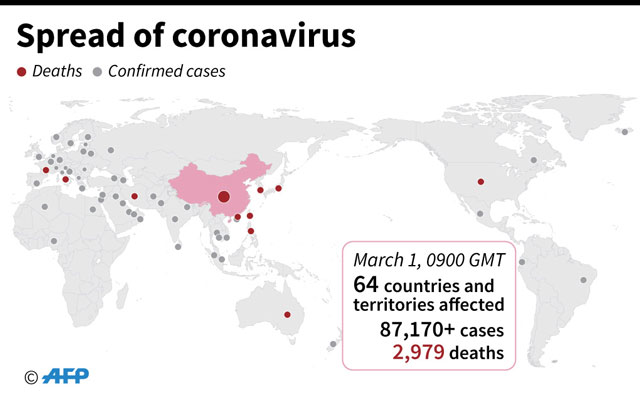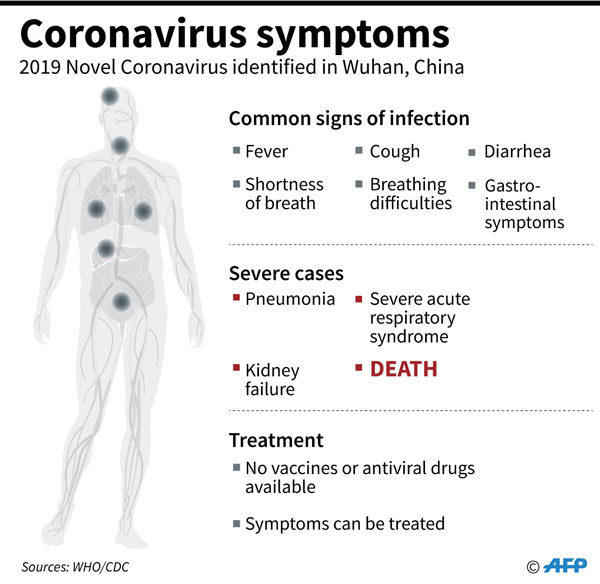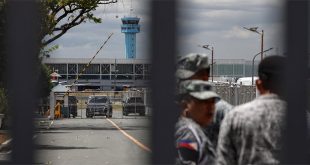
Johannesburg, South Africa | AFP | The coronavirus is spreading fast beyond its China birthplace but sub-Saharan Africa, one of the world’s most vulnerable regions, has so far been almost spared — and experts want to know why.
China reported a fresh spike in coronavirus infections on Sunday, while there was a first death on American soil and Australia registered its first fatality.
The virus has spread to more than 60 countries around the globe, prompting the World Health Organization to raise its risk assessment to its highest level.
Worldwide, nearly 3,000 people have been killed and more than 87,000 infected since the virus was first detected late last year in the central Chinese city of Wuhan.
China on Sunday reported 573 new infections, the highest figure in a week after a dip. All but three of them were in Hubei province, of which Wuhan is the capital.
But across all of Africa, just three cases have surfaced — a tally that has health specialists scratching their heads, given the continent’s close economic ties with China.
“This is the question that everyone is asking, especially as other regions such as South America or Eastern Europe now have cases,” said Amadou Alpha Sall, head of the Pasteur Institute in Dakar, the Senegalese capital.
“The current figures could be the reality, it’s hard to know. Maybe it’s because Africa is not that connected.”
Thumbi Ndung’u, director of a Durban-based infectious disease research centre, SANTHE, said “I don’t think anybody knows” why Africa so far appeared to be unscathed.
He also speculated that it could be “there isn’t much travel to that particular part of China from Africa — back and forth”.
Or “it could just be a coincidence,” said Ndung’u.
– Coverup unlikely –
Could it be a coverup, or cases that have gone undetected?
Michel Yao, an emergency response expert at WHO Africa, based in the Congolese capital Brazzaville, said these scenarios were most unlikely.
To detect and hide cases would require an “exceptionally managed” response, he said.
And undetected cases would result in an outbreak that would be “surely detected, because it spreads faster,” Yao said.
Could Africa’s predominantly hot climate ward off or even kill the virus?
“There is no current evidence to indicate that climate affects transmission,” said Rodney Adam, who heads the infection control task force at the Aga Khan University Hospital in Nairobi.
“While it is true that for certain infections there may be genetic differences in susceptibility… there is no current evidence to that effect for COVID-19.”
If the continent can count itself lucky so far, experts say it is just a question of time.
“We think Africa is going to be affected,” said Yazdan Yazdanpanah, head of infectious diseases department at Paris’s Bichat hospital.
On the plus said, the apparent delay has given African countries precious weeks in which to prepare.
Yao said more than half of sub-Saharan countries are now equipped with laboratories that can test for the virus — up from just two a few weeks ago.
“In the beginning we had two, South Africa and Senegal… (now) we have 29 out of 47 countries that have laboratories that can perform the tests. So this is progress,” he said.
“We were lucky to have a big window of opportunity,” he said.
Another positive is that Ebola outbreaks that have struck parts of West Africa and the Democratic Republic of Congo have generated valuable skills for handling coronavirus.
There is currently no vaccine or cure for the novel virus — the response is to contain it by identifying and isolating patients and carrying out grassroots awareness campaigns.
“This experience may add value on ground,” said Yao.

– Question of time –
Despite this, Africa’s vulnerabilities are well known.
A 2016 analysis by the Rand Corporation, a US thinktank, found that of the 25 countries in the world that are most vulnerable to infectious outbreaks, 22 are in Africa — the others were Afghanistan, Yemen and Haiti.
Africa’s many conflict zones, poor health infrastructure and porous borders are among the factors that accentuate the risk, it said.
Last week a Lancet study found that only Egypt, Algeria and South Africa had “the most prepared health systems in the continent” to handle the virus.
South Africa announced Thursday that its citizens trapped in China’s Wuhan city, would be evacuated and placed in quarantine for 21 days.
In many countries, a sudden surge in numbers of seriously ill patients could overwhelm intensive care units.
“Africa is at high risk,” said Yao.
On Thursday, Madagascar banned all travellers who recently visited Iran, Italy or South Korea — the latest countries suffering major outbreaks of the virus — from entering the island country, a popular tourist destination.
Several African airlines including Kenya Airways have suspended flights to China, although the continent’s biggest carrier Ethiopian Airlines has kept its China routes open.
S.Africa to airlift 151
Meanwhile, South Africa will evacuate 151 citizens from the coronavirus-hit Chinese city of Wuhan within days, the health minister said Sunday, as the death toll and number of infected worldwide mounted.
The decision to airlift the trapped South Africans came after President Cyril Ramaphosa on Thursday directed the repatriation of those who have asked to return home.
“We were asked by the president to start the process immediately — (so) within seven to 10 days (the evacuation team) must have completed the task,” Health Minister Zweli Mkhize said.
The minister told a news conference at the country’s main OR Tambo International airport that there were 201 South Africans in Wuhan — the epicentre of the virus, and that “151 have indicated they want to be repatriated”.
The group will be kept in quarantine for 21 days at a site authorities have refused to disclose.
“The people we are bringing in are South Africans who are healthy and as far as we are concerned, are not infected,” Mkhize said.
The repatriation process will be executed by the military.
South Africa will be the latest country to extricate its nationals from Wuhan, where the deadly coronavirus outbreak first emerged in December.
Until Friday when a case was detected in Nigeria, sub-Saharan Africa had largely escaped the fast-spreading epidemic.
 The Independent Uganda: You get the Truth we Pay the Price
The Independent Uganda: You get the Truth we Pay the Price



If we manage cholera in Africa how can we fail to manage a simple flu. Excuse us we are not vulnerable . It’s you who are vulnerable and in you selfish quest to amass our wealth you bring diseases so that you wipe us out. There it is God is punishing you on our behalf